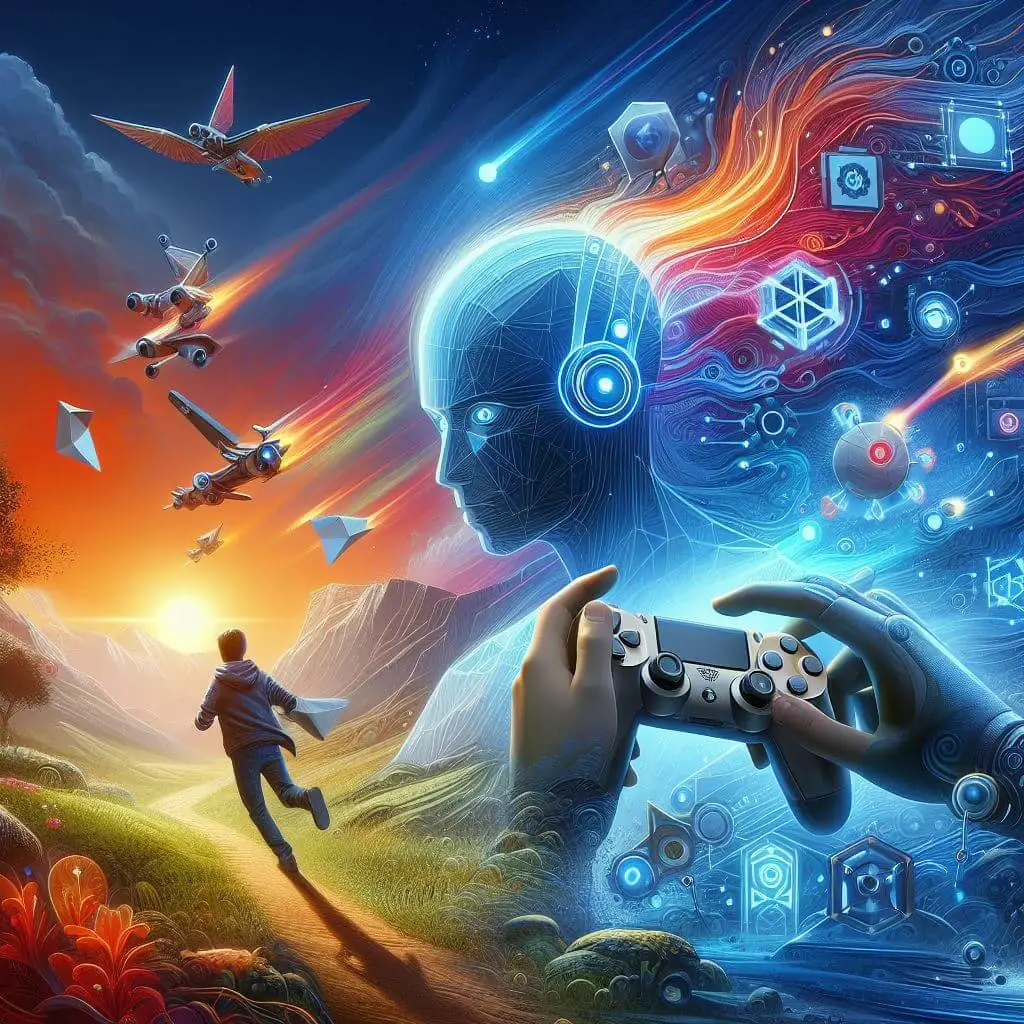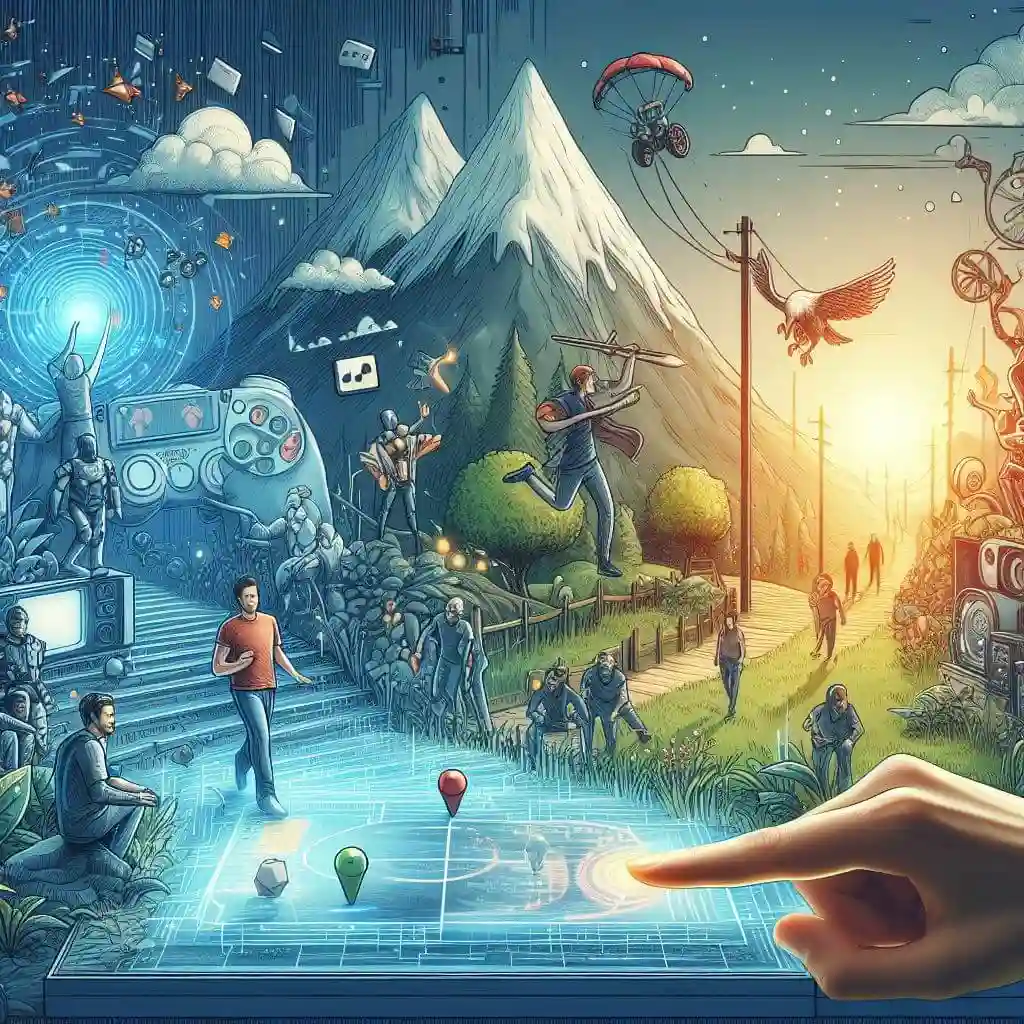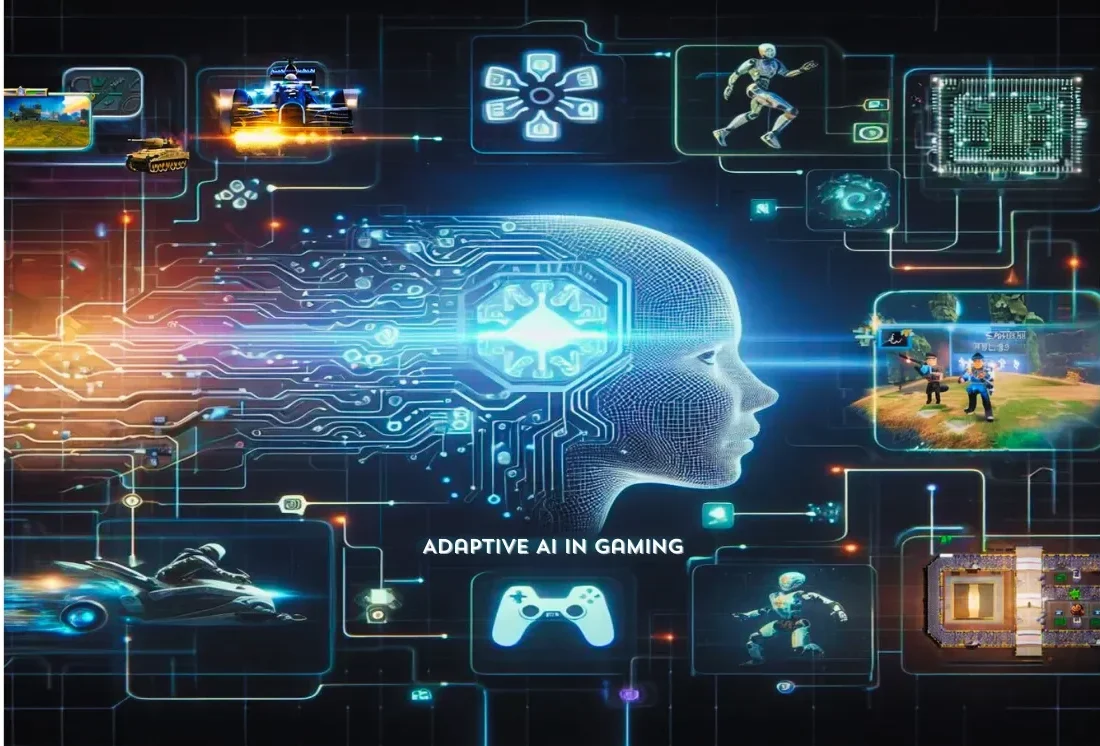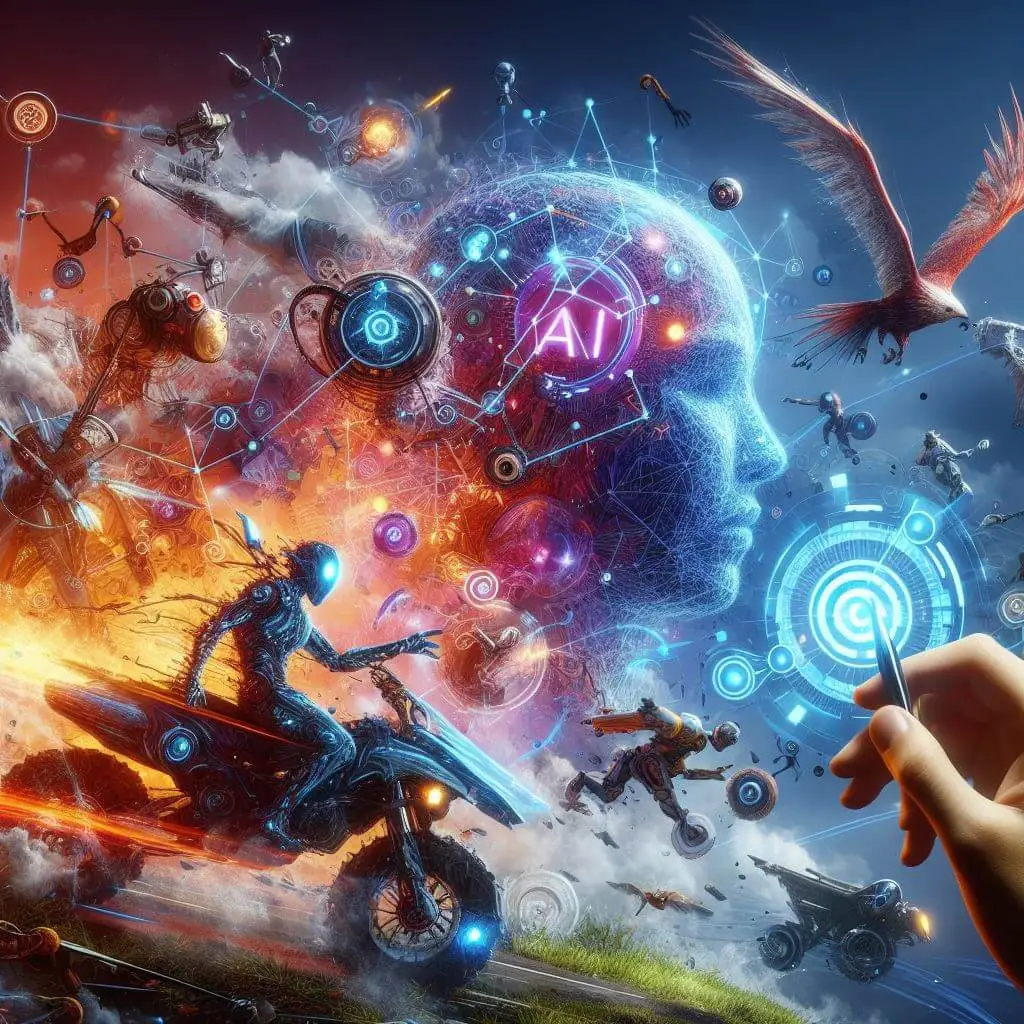What is Adaptive AI:
Adaptive AI leverages machine learning to iteratively analyze data, learn from experience, and optimize performance without human intervention. Techniques in deep learning and reinforcement learning enable systems to self-improve based on emerging data patterns and feedback. This empowers AI to adapt to dynamic real-world environments, users, and challenges.
Innovations of Adaptive AI in Gaming Industry
The innovations and advancements in Adaptive AI in Games have revolutionized the gaming industry, introducing new possibilities and experiences that have reshaped the way games are developed and experienced by players.
Diverse Game Content
Adaptive AI has enabled procedural content generation, allowing games to dynamically generate levels, quests, challenges, and other content, providing players with diverse and ever-changing experiences. This innovation has greatly enhanced the replayability and longevity of games, offering an endless array of content to explore.
Infinite Content Possibilities
By embracing Adaptive AI, game developers can efficiently create larger, more intricate game environments and content in less time. This efficiency and scalability enable games to offer expansive and immersive worlds, opening the door to limitless exploration, discovery, and player engagement.
Endless Exploration and Discovery
Games powered by Adaptive AI can create environments that evolve, regenerate, and adjust based on player interactions and behavior, providing a dynamic and immersive experience that invites players to explore and discover the ever-changing and responsive game world.
The incorporation of Adaptive AI in Games has ushered in a new era of gaming, offering players diverse, dynamic, and personalized experiences characterized by expansive worlds, endless possibilities, and a level of previously unattainable.
Adaptive AI in Video Games: Advancements and Innovations
In the world of gaming, Adaptive AI in Games refers to the implementation of Artificial Intelligence (AI) technology that allows non-player characters (NPCs) to adapt and evolve in response to player actions, creating a personalized and dynamic gaming experience. This innovation has significantly impacted the gaming industry, revolutionizing the way games are developed and experienced by players worldwide.
Technological Advances Enabling Adaptive AI
The rapid evolution of modern PCs and game consoles, as well as the emergence of cloud gaming services, has played a pivotal role in empowering game developers to advance the capabilities of Adaptive AI. Cloud computing has unlocked the potential for more sophisticated AI behavior, especially in gaming graphics, by leveraging the computing power of the cloud. Furthermore, more powerful processors and increased memory enable the deployment of significantly more advanced AI algorithms than previously possible.
Mirroring Player Behavior
One of the groundbreaking innovations facilitated by Adaptive AI is the ability to mirror and learn from player behavior. This feature provides players with a personalized and dynamic gaming experience by allowing the game to adapt to the player’s specific actions, decisions, and style, thereby creating a more engaging and immersive gameplay environment.
Enhancing Gameplay and Narrative through Adaptive AI
Adaptive AI has not only revolutionized gameplay but has also significantly enhanced the storytelling and narrative aspects of games. By creating dynamic stories, responsive characters, and immersive environments that adapt to the player’s interactions and context, games powered by Adaptive AI can deliver more impactful and emotionally engaging experiences.
Technical Challenges and Ethical Issues in Adaptive AI Implementation
Despite the significant advancements in Adaptive AI, its implementation poses technical challenges such as complexity, unpredictability, and potential bugs. Additionally, there are ethical considerations to be addressed, including privacy, consent, and potential manipulation, ensuring that Adaptive AI is utilized responsibly and transparently to provide a positive gaming experience for players.
Types of Adaptive AI in Games: machine learning techniques
Rule-based AI, Finite State Machines, Pathfinding AI, Machine Learning AI, Behavior Trees, and Reinforcement Learning are among the most common and effective AI techniques used in game development. Each technique offers unique capabilities and applications that contribute to the advancement of Adaptive AI in the gaming industry.
The continuous advancements and innovations in Adaptive AI technology have paved the way for an exciting and immersive gaming landscape, offering players a more personalized, engaging, and emotionally impactful gaming experience.
| AI Type | Overview | Functionality | Use Cases |
|---|---|---|---|
| Rule-based AI | Operates on predefined rules and logical statements | Uses if-then rules for decision-making | Game mechanics, simple decision-making processes |
| Finite State Machines | Represents behavior through states, transitions | Transitions based on predefined conditions | Game character behaviors, animation states |
| Pathfinding AI | Finds optimal paths in a given environment | Uses algorithms like A* or Dijkstra’s for routing | Robotics, video games, logistics (route planning) |
| Machine Learning AI | Learns from data to improve performance | Trained on datasets, recognizes patterns | Image recognition, natural language processing, etc. |
| Behavior Trees | Hierarchical structures for agent behavior | Nodes represent actions, conditions, or tasks | Game character behaviors, mission logic |
| Reinforcement Learning | Learns through trial and error with feedback | Agent learns from rewards or penalties | Game playing, robotic control, resource management |
Examples of Adaptive AI in Games
Designing Adaptive AI for Games
The role of Adaptive AI in Games is pivotal in tailoring the gaming experience to each player’s unique skill level, style, and preference. Unlike traditional AI systems, which often follow predetermined patterns and behaviors, Adaptive AI dynamically adjusts its strategies, challenges, and responses to provide a more engaging and immersive experience for the player.
Understanding the broader concept, the process of designing adaptive AI for games involves the AI learning from player actions and adjusting its behavior accordingly. This LinkedIn article offers insight into the role of adaptive AI in enhancing gameplay experiences. Next, we will explore some examples from the article and examine additional instances in more detail
Adaptive AI in Left 4 Dead: Using AI Director for Dynamic Enemy Placement
In the renowned game Left 4 Dead, the AI Director system dynamically controls the spawning and placement of enemies, items, and events based on the player’s actions, health, and location. This adaptive approach ensures that the game environment remains challenging and engaging, providing a unique experience for each playthrough.
1. The AI Director System
- The AI Director, sometimes referred to as AID, actively monitors player actions, health status, and location within the game environment.
- The Director is responsible for dynamically altering the game environment by spawning enemies, items, and modifying scenarios in real time.
2. Game Difficulty Adjustment
- Left 4 Dead 2 employs adaptive AI for game difficulty adjustment. The AI learns from player responses, tailoring challenges to individual skill levels.
3. Dynamic Difficulty Graduation
- The game employs player modeling to dynamically adjust the difficulty, ensuring a personalized and adaptive gaming experience for each player. Learn more about Dynamic Difficulty Adjustment through an Adaptive AI on ResearchGate
Adaptive AI in F.E.A.R.: Goal-Oriented Action Planning for Enemy Behavior
F.E.A.R. employs a goal-oriented action planning system that allows enemies to choose from a set of actions and goals based on the environment and the player’s behavior. This adaptive behavior makes encounters with enemies unpredictable and responsive to the player’s strategies, adding depth and excitement to the gameplay.
Adaptive AI in Alien: Isolation: Reinforcement Learning
You still don’t understand what you’re dealing with, do you…? The perfect organism… Its structural perfection is matched only by its hostility…
In Alien: Isolation, the alien utilizes a reinforcement learning system to learn from its own actions and rewards, adapting its hunting and hiding strategies based on the player’s actions and location. This adaptive behavior creates tense and dynamic gameplay, providing players with a sense of genuine challenge and unpredictability.
Overview
Alien: Isolation showcases a sophisticated implementation of adaptive AI, particularly in the behavior of its Xenomorph antagonist. The AI system dynamically adjusts to player actions, creating a suspenseful and unpredictable gaming experience.
Key Aspects of Adaptive AI
1. Learning Player Patterns
The Xenomorph AI adapts to player patterns, enhancing the challenge based on their actions. For instance, if players consistently hide in lockers or under desks, the AI intensifies its searches in these areas, making the gameplay more dynamic and challenging. This learning mechanism adds a layer of unpredictability to the game
2. Misconception Clarification
Contrary to a common misconception, the Xenomorph AI doesn’t directly learn when it kills the player. Instead, the game’s AI design provides hints to the AI about the player’s location, unlocking different behaviors. This clarifies the role of adaptive elements in creating an immersive experience. Check this Steam Community
3. Terrifyingly Amazing AI
The Xenomorph’s AI in Alien: Isolation is considered a crowning achievement. Its ability to adapt its behavior contributes significantly to the game’s success, providing players with a suspenseful and tense atmosphere
Adaptive AI in Spore: Evolutionary Algorithm
Spore utilizes an evolutionary algorithm system that allows creatures to evolve their appearance, abilities, and behavior based on the player’s choices and interactions. This adaptive evolution enhances the diversity and complexity of the game world, providing players with a unique and constantly evolving experience.
Overview
Spore, a simulation game developed by Maxis, leverages adaptive AI to create a dynamic and immersive gaming experience. This innovative use of AI allows players to guide the evolution of their species through various stages, from microscopic organisms to advanced civilizations.
Key Aspects of Adaptive AI
1. Evolutionary Progression
Spore’s adaptive AI excels in representing evolutionary progression. The AI dynamically adjusts challenges and opportunities based on the player’s decisions throughout different evolutionary stages. This ensures a unique and personalized experience for each player.
2. Adapting to Player Choices
The AI adapts to the player’s choices, influencing the development of their species. Whether opting for a peaceful or an aggressive approach, the AI responds by shaping the game world and presenting challenges tailored to the player’s decisions.
3. Dynamic Environmental Responses
Spore’s adaptive AI extends to dynamic environmental responses. The game world reacts to the player’s actions, affecting the ecosystem and interactions with other species. This adaptability adds depth to the gameplay, making each playthrough distinct.
4. User-Generated Content
Spore allows players to create and share their content, including creatures, buildings, and vehicles. The adaptive AI ensures that user-generated content seamlessly integrates into the game world, contributing to the overall diversity and richness of the Spore universe.
Adaptive AI in Horizon Zero Dawn: Neural Network System for Machine Learning
In Horizon Zero Dawn, the game’s neural network system enables machines to learn from data and make predictions or decisions based on the player’s actions and the environment. This adaptive AI technology brings a new level of sophistication to the game, creating a deeply immersive and responsive gaming experience.
Overview
Horizon Zero Dawn, Developed by Guerrilla Games, showcases cutting-edge Adaptive AI, enriching the gaming experience with dynamically evolving challenges. the game introduces machine animals driven by sophisticated AI systems.
AI Advancements
- Neural Network System: Horizon Zero Dawn incorporates a powerful neural network system governing the behavior of machine-animals. This system enables dynamic decision-making, responding to player actions and in-game events.
- Adaptive Difficulty: Player discussions suggest the implementation of adaptive difficulty in the game. The AI adapts the difficulty level based on player performance, ensuring a challenging yet enjoyable gaming experience.
Adaptive AI in Horizon Forbidden West
As Horizon Zero Dawn‘s successor, Horizon Forbidden West was released for PlayStation 4 and 5 on February 18, 2022. Guerrilla Games has confirmed that Horizon Forbidden West will be available on PC in early 2024. Adaptive AI plays a pivotal role in Horizon Forbidden West, revolutionizing the gaming experience by dynamically tailoring various aspects of the game to the player’s preferences, skill levels, and actions. It creates a responsive and engaging gaming environment, showcasing the advancements in AI technology for a unique gaming adventure.
Key Aspects of Adaptive AI:
- Enhanced Enemy Dynamics:
- The AI of enemies in Horizon Forbidden West adapts in real-time, offering a more immersive and challenging combat experience. This adaptability introduces an element of unpredictability to enemy encounters, keeping players engaged throughout the game
- Dynamic Difficulty Adjustment:
- Horizon Forbidden West employs adaptive AI to dynamically adjust the game’s difficulty based on the player’s performance. This ensures that both newcomers and seasoned players find the game challenging and enjoyable, providing a customized gaming experience for individual skill levels.
- Believable NPC Interactions:
- The scope of adaptive AI extends beyond combat to non-playable characters (NPCs), enhancing their behaviors and interactions with the player and the game world. This results in a more realistic and immersive gaming environment.
- Integration with DualSense Controller:
- Adaptive AI integrates with the unique features of the DualSense controller, such as adaptive triggers and haptic feedback. This integration further heightens the sensory experience, complementing the adaptability of the AI and immersing players more deeply into the game world.
F1 Series: Adaptive AI in F1 22 and F1 23
Overview
Adaptive AI plays a crucial role in both F1 22 and F1 23, enriching the gaming experience by dynamically adjusting difficulty levels based on player performance. aiming to help players stay competitive by dynamically adjusting the difficulty level, ensuring an engaging and balanced racing experience. read more EA Answers HQ and The Loadout.
Impact on Gameplay
- Enabling Adaptive AI in F1 22 results in the automatic activation of various assists, making the game more accessible.
Adaptive AI in F1 23
Providing a personalized and engaging gameplay environment Adaptive AI in F1 23 is designed to make the game more challenging for players of all skill levels by adapting the AI’s strategy and improving car performance. It aims to offer a more realistic and immersive racing experience by dynamically adjusting various aspects of the game, such as difficulty levels and opponent strategies
The Role and Impact of AI in Games
Control and Behavior of Non-Player Characters (NPCs)
One of the fundamental aspects of Adaptive AI in Games is its role in controlling the behavior of non-player characters (NPCs). Adaptive AI allows NPCs to exhibit dynamic and responsive behaviors, making the gaming experience more engaging and immersive. These NPCs can adapt to the player’s actions, evolving alongside the player’s progress, and providing a more personalized and challenging experience.
Game Difficulty Levels: Personalization and Adaptation
Adaptive AI has revolutionized the concept of game difficulty levels by infusing them with a new dimension of personalization. This innovation caters to players of varying skill levels and gaming styles, ensuring that each player experiences a level of challenge that is tailored to their abilities and preferences. By measuring player success rates and technique preferences, game difficulty can be dynamically adjusted to provide an optimal gaming experience for every individual.
Advancing Game Challenges
A critical aspect of Adaptive AI in Games is its ability to maintain player immersion by ensuring that game challenges and experiences remain within the boundaries of the game world. Through the adaptive adjustment of pacing, difficulty, and opponent strategies, games can avoid breaking player immersion, thereby enhancing long-term engagement and enjoyment.
Adapting to Different Types of Gamers / Gaming Styles
The diverse nature of gamers and gaming styles presents a challenge for game developers. Adaptive AI technology addresses this challenge by adapting to different types of gamers. from those who seek relaxation and immersion in the game world to thrill-seeking players who thrive on intense challenges. By identifying player techniques and preferences, AI opponents can adjust their abilities and strategies, ensuring that the gaming experience remains captivating and satisfying for all types of players.
The infusion of Adaptive AI into game development exemplifies its significant impact on providing a more personalized, challenging, and immersive gaming experience that caters to a wide range of players’ abilities and preferences.
Finale: Pushing The Boundaries!
The advent of Adaptive AI in Games has brought about a monumental shift in the gaming landscape, redefining the way games are developed and experienced. Looking ahead, the implications and potentials of AI in game development are incredibly promising, opening up new horizons and possibilities for the gaming industry.
Recap of the Evolution of Adaptive AI in Gaming
The journey of Adaptive AI in Games has been marked by significant advancements, enabling more personalized, engaging, and immersive gaming experiences for players. From dynamic enemy placements to evolving narratives and procedural content generation, Adaptive AI has fundamentally transformed the fabric of the gaming universe.
Future Potentials and Implications
The future of game development holds tremendous potential for further advancements in Adaptive AI, presenting opportunities to create even more dynamic, realistic, and emotionally engaging experiences for players. These advancements will continue to elevate player immersion, engagement, and satisfaction, pushing the boundaries of what is possible in the gaming industry.
Ethical Considerations of Adaptive AI
As the potential of Adaptive AI continues to unfold, it is imperative to consider and address ethical considerations associated with its implementation. Responsible and transparent use of AI in game development will be essential in ensuring that players have a positive and enjoyable gaming experience while maintaining their privacy, autonomy, and emotional well-being.
Promising Prospects
With the ongoing evolution of Adaptive AI in Games, players can anticipate a future filled with even more personalized, engaging, and emotionally impactful gaming experiences. The gaming industry is poised to continue pushing the boundaries of what is possible, delivering unparalleled experiences that captivate, inspire, and immerse players in rich and dynamic game worlds.
 TL;DR
TL;DR
By employing machine learning techniques such as deep learning and reinforcement learning, the integration of Adaptive AI into game development becomes a game-changer for developers. This is achieved through the utilization of various AI tools, including finite state, pathfinding, and behavior trees, crafting a genuinely adaptive experience. Examples from groundbreaking games like Spore and Horizon Zero Dawn vividly showcase how Adaptive AI not only tackles technical challenges but also enriches storytelling in ways traditional approaches can’t. It adapts to player interactions, seamlessly adjusts, and creates an immersive and personalized gaming experience.
The future is filled with promises of endless possibilities, new horizons, and exciting developments that will undoubtedly shape and redefine the gaming landscape for years to come. Until next time, stay Savvy.









Thanks for all the time you’ve invested in creating such a valuable online resource!